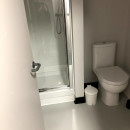Oxford: Amazing from Some, Not for All June 25, 2021
By A student (Wellesley College) - abroad from 09/06/2021 to 06/18/2021 with
Worcester College, University of Oxford - Visiting Students Program
I gained independence--I learned I was capable of taking care of myself for long periods of time without my parents (I usually study close to home and shamelessly take advantage of that fact). I got experience meal planning, cooking, shopping, doing my own laundry, and cleaning. I learned a lot of new physics and significantly strengthened my independent study skills and background (Oxford is kind of insane about what it expects you to know but that does really do great things for your knowledge base). I traveled alone for the first time, both internationally and within the UK, which was an empowering experience. I made friends and learned about a new culture (both the academic culture and that of the UK). I tried new food and expanded my palate. Overall, the year itself wasn't ideal, but Oxford was the best possible place I could have been.
Review Photos





Personal Information
| How much international exposure did you have prior to this program? | 2 weeks - 1 month |
Review Your Program
|
* Overall educational experience
Academic rigor, intensity, resources, etc. |
I greatly enjoyed my academic experience at Worcester (a good thing too with COVID, as especially the first term not much else was going on). I took an extremely rigorous course of study (five third-year physics tutorials and one philosophy of physics tutorial plus the September Seminar) and it was a big adjustment at first. Oxford assigns very challenging problem sets, but expects a lower completion rate--completing 70% of a problem sheet is often doing quite well. Tutorials are a bit strange--you don't get much teaching from the tutor, just a review of the correct answers and process (often presented by another student or yourself). However, it is a fantastic way to learn how to be more self-sufficient and learn how to self-teach from textbooks, lectures, and other resources (a valuable skill for graduate school). Also, the head tutors keep an eye on your progress and will provide more help if you are struggling. Ultimately, Oxford's education is very hard to compare to a US institution's and whether it works for you is very much down to your own learning style and commitment to make it work. I loved it most of the time (I was well prepared to thrive on my own and enjoyed the opportunity to set my own schedule and see the effort of purely my own work without instructional hand-holding), but sometimes the lack of organization and outright support (Wellesley's faculty heavily *teach* the material in a way Oxford tutors don't) was frustrating. Also, the material was fascinating and on subjects I would have difficulty finding in my current educational surroundings (even MIT rarely offers those specific classes at an undergraduate level). |
|
* Host Country Program Administration
On-site administration of your program |
Michael Mayo (the program director) is fairly good at checking in and answering questions, although is not always the best at resolving actual problems. Overall, Oxford is very disorganized and slow moving, but fairly good at making things work for you. Additionally, it is useful to seek your own resolutions and be proactive. I was happy enough with how things worked out for me. |
|
* Housing:
How satisfied were you with your living arrangements? |
Living accommodations were pretty great for me. En suite bathrooms, great kitchen, mini fridge provided in room, comfortable furniture (office chair, table, and living room-style chair). Sufficient laundry facilities. Things were a little slovenly this year, as there was no housekeeping due to COVID, which lead to some gross conditions in the kitchens, but they didn't start out that way and it would be differently typically. Also, I was pleased with the responsiveness of maintenance. |
| * Food: |
I didn't really eat the food from the hall, but it was fairly decent the times I did have it. You could order self-isolation food packs as well, which were substantial and could be catered towards dietary restrictions. I did a lot of cooking, as the kitchens are pretty great. There are four plus grocery stores within about half to three quarters of a mile walk (Tesco, where I did most of my shopping, Sainsbury's, Marks & Spencer, and Co-op). Additionally, Gloucester Green has a farmer's market on Wednesdays. |
|
* Social & Cultural Integration:
How integrated did you feel with the local culture? |
I lived with visiting students exclusively, but took tutorials with matriculated students. I had one good friend who was a matriculated student. I think this aspect would have been better in an ordinary year--it was hard for everyone to socialize this year. I also did all my own grocery shopping in local stores, tried a lot of local restaurants/food stalls, and did some touristing. |
|
* Health Care:
How well were health issues addressed during the program? |
As a full year student, I had access to the NHS, but fortunately never had to use it. There's also a nurse in college I think for minor matters. The uni did a good job distributing COVID tests to those who needed/wanted them and restrictions were in place but not excessive. |
| * Safety: |
I always felt extremely safe, especially in college. I was rarely out late, however. The college has the porters at the front gate and all entrances are ID-controlled. |
| If you could do it all over again would you choose the same program? |
Yes
I chose Oxford due to the amazing opportunities in my field of study and the location (I really wanted to spend time in England). Both of these choices were the correct ones for me. The third-year physics classes were just as fun as they sounded and I loved pretty much everything about England (I had a ton of fun trying random food from the grocery store, eating takeaway, and going to museums when possible). Further, I knew Oxford favored independent learning, which works well for me as long as I have some level of supervision keeping me accountable. |
Finances
|
* Money: How easily were you able to live on a student's budget?
(1 = not very easy/$200+ on food & personal expenses/week, 2.5 = $100/week, 5 = very easily/minimal cost) |
Oxford is expensive (eating out especially). Luckily, I was not self-financing and was supported by my parents. Worcester's hall food is not as expensive as some and cooking can also cut down on costs. |
| Not including program expenses, about how much money did you spend on food and other expenses each week? | not sure |
| Do you have any general money-saving tips for future study abroad participants? | Try not to eat out too much and be careful that you only buy what you need. Walk rather than take the bus/taxi. Walk to pick up takeaway rather than do delivery. See if you can get necessary items secondhand. Additionally, Gloucester Green Market does days when you can buy used clothes and the farmer's market is fairly cheap (and the stall food isn't too expensive). Don't buy books when possible. Find pdfs or request from/read in library or the online access services. If you're traveling buy a railcard (there's one for students and for 30 pounds you save 33% on *every* train ticket). Also, book in advance. Look for other student discounts. They do exist here. |
Language
| * Did your program have a foreign language component? | No |
Other Program Information
|
* Where did you live?
Select all that apply |
|
|
* Who did you live with?
Select all that apply |
|
|
* Who did you take classes with?
Select all that apply |
|
| About how many local friends did you make that you will likely keep in touch with? |
A Look Back
| * What did you like most about the program? |
|
| * What could be improved? |
|
| * What do you know now that you wish you knew before going on this program? | Classes are hard and they're supposed to be! Don't feel bad if you struggle at first with the material--that's normal even for matriculated students and the standard of success is lower because the material is so hard (70% is an A and they mean it). Also, |
Reasons For Studying Abroad
| To help future students find programs attended by like-minded individuals, please choose the profile that most closely represents you. |
The Academic or LinguistYou went abroad with specific academic goals in mind; the program credentials and rigor of your coursework abroad were very important to you. You had a great time abroad, but never lost sight of your studies and (if applicable) were diligent with your foreign language study. Good for you! |
Individual Course Reviews
| Course Name/Rating: |
B2: Symmetry and Relativity |
| Course Department: | Physics |
| Instructor: | Stefan Zohren |
| Instruction Language: | English |
| Comments: | I liked this course. The material was a thorough introduction to relativity and electromagnetism using the tensor formalism and leads to an undergraduate course in general relativity. Stefan was my favorite tutor, as his tutorials were the most engaging and organized. We usually met in groups of twos or threes and would take turns presenting on the problem sheet questions according to who did the problem best. He was good at making sure no one felt pressured or uncomfortable doing so and was adequately prepared if asked. B2 was challenging for me, but not as much as some of the other courses. I participated fairly thoroughly in this class as I enjoyed it and was fairly good at it. I was assessed at collections (1/3 of my grade) and a set final in Trinity (2/3 of my grade). I believe class participation may have factored in slightly as well. |
| Credit Transfer Issues: | This class has no Wellesley equivalent. I assume I could transfer it as a 300-level W class, but did not need to. |
| Course Name/Rating: |
B3: Atomic and Laser Physics |
| Course Department: | Physics |
| Instructor: | Lucas Hofer |
| Instruction Language: | English |
| Comments: | Lucas was a graduate student of one of the head tutors and a poor instructor. He never returned marked problem sheets before class, frequently put students on the spot, and had clear favorites. He also was a rather dull lecturer and poor at keeping the class's respect and attention. Fortunately, he is unlikely to be teaching after a certain point, due to being a graduate student. He was my only poor experience with instruction. This class was assessed in the same fashion as B2. |
| Credit Transfer Issues: | Course has no W equivalent as with B2. |
| Course Name/Rating: |
B4: Nuclear and Particle Physics |
| Course Department: | Physics |
| Instructor: | Stefan Zohren |
| Instruction Language: | English |
| Comments: | This class was brutally difficult at first, but ultimately fascinating. It is a basic introduction to particle physics, covering the same material roughly as a graduate course but with fewer details and a lower standard of mathematics (no field theory/quantum electrodynamics). The teaching and assessment was the same as B2. |
| Credit Transfer Issues: | See above. |
| Course Name/Rating: |
B5: General Relativity |
| Course Department: | Physics |
| Instructor: | Stefan Zohren |
| Instruction Language: | English |
| Comments: | An undergraduate introduction to general relativity. Fascinating and well-taught, although I would have done well to access to course textbook earlier. Same instruction and assessment as B2, B4. |
| Credit Transfer Issues: | See above. |
| Course Name/Rating: |
B6: Condensed Matter Physics |
| Course Department: | Physics |
| Instructor: | Huw Davies |
| Instruction Language: | English |
| Comments: | An undergraduate introduction to condensed matter physics. Somewhat dull. Huw was a rather traditional lecturer and liked to give very long (3 hr+ sometimes) reviews of the problem sheets, rather than having students present. However, he did a good job explaining and I appreciated his work to teach the material. Assessment same as B2. |
| Credit Transfer Issues: | See above. |
| Course Name/Rating: |
Philosophy of Quantum |
| Course Department: | Philosophy of Physics |
| Instructor: | Johannes Fankhauser |
| Instruction Language: | English |
| Comments: | This class was fascinating, but it was challenging writing 1500 word essays every week on top of two problem sets, so I wasn't able to put as much into the course as I'd have liked. Quantum is my favorite subsection of physics and philosophy is a side interest of mine, so seeing the two interact was great fun. Additionally, the material covered is extremely useful (decoherence, Bell inequalities, entanglement, EPR correlations), as it shows up in research and further classes and it is not addressed elsewhere in the curriculum much. The tutorials were one-on-one and sometimes very intense: we'd go over my essay and he'd ask why I'd written a certain thing. He'd also grill me a bit on the readings. It was a bit nerve-wracking but occasionally fun. |
| Credit Transfer Issues: | I believe this will transfer as a 200-level philosophy course, as I discussed this with the philosophy chair. |
| Course Name/Rating: |
September Seminar in the Humanities |
| Course Department: | |
| Instructor: | Various |
| Instruction Language: | English |
| Comments: | This was a fun course with a relatively light workload: two 2000 word essays. The tutors were very interesting and the book discussions could be quite fun. It was a wonderful introduction to the Oxford tutorial and I greatly recommend it. |
| Credit Transfer Issues: | Probably transfers as a generic unit of credit. |








